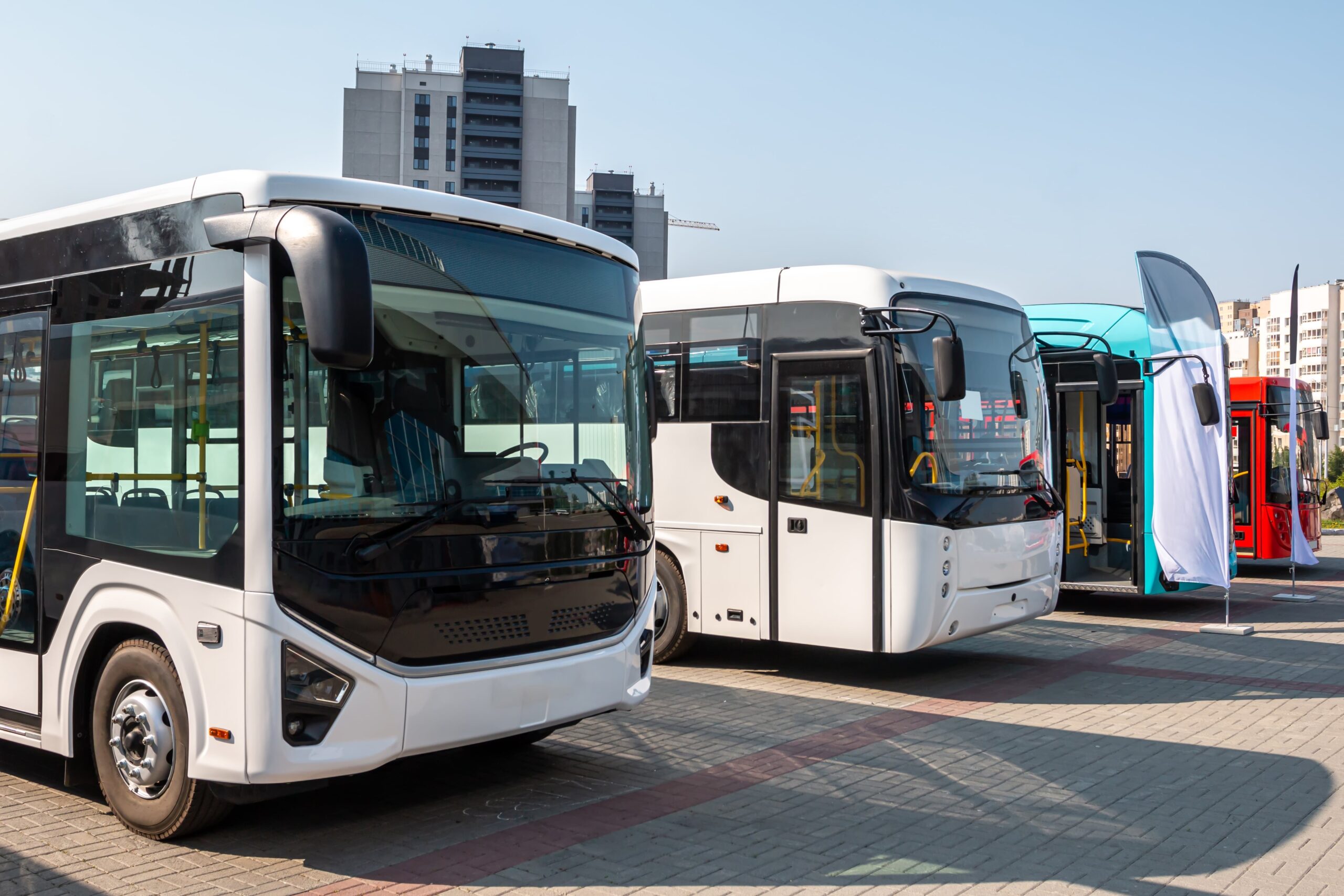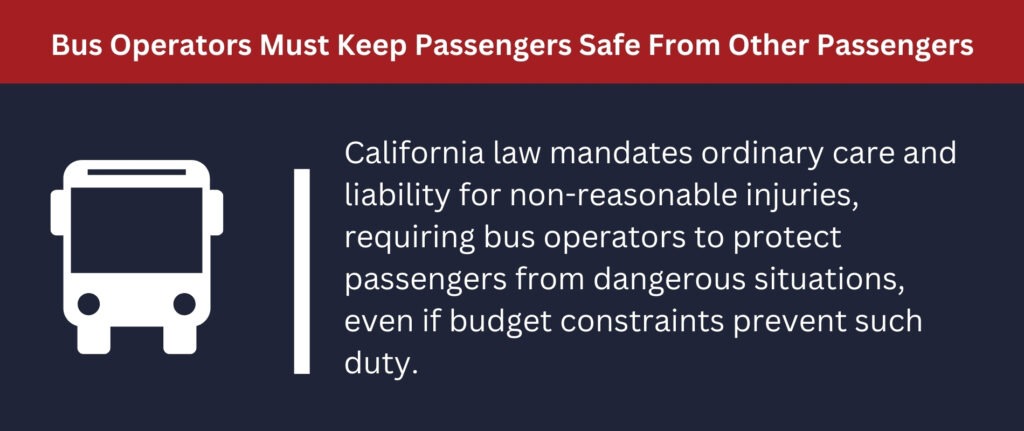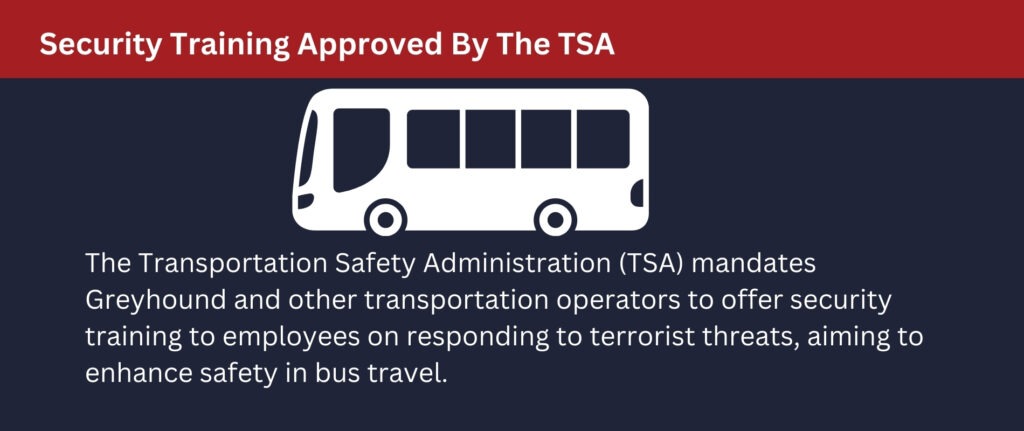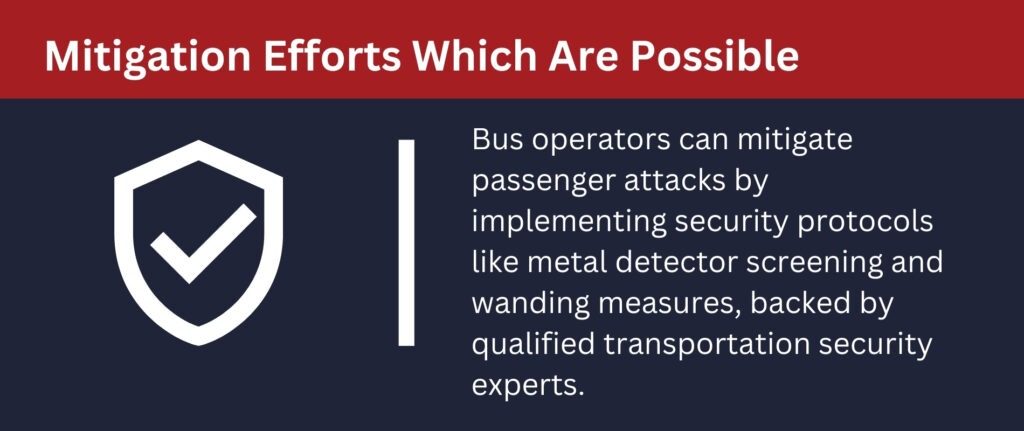
Passengers being attacked on buses is not a new phenomenon. However, these attacks are, unfortunately, becoming more common.
California has seen several passenger on passenger assaults as of late:
- Five passengers, in February 2022, while exiting a bus were shot in Oroville by another passenger.
- In 2020, a passenger shot six passengers on a Greyhound bus going from L.A. to San Francisco. One passenger was killed and five were wounded.
This article will:
- Explain about bus operators’ legal duty owed to passengers
- Explain about the options available to victims of negligent security
- Explain what kind of evidence can support liability claims regarding passenger on passenger assault cases
A Bus Operator Is A “Common Carrier”
California law considers a bus operator to be a “common carrier.”
California Civil Code section 2168 states that common carriers are anyone who offer to the public the service of carrying messages, property or persons, with the sole exception of telegraphic messages. This means that the operator of a bus owes a heightened, statutory duty of care regarding their passengers.
California Civil Code section 2100 states that those who carry persons for money need to use utmost care and utmost diligence to carry people safely, that they need to provide people everything that is necessary to carry them safely, and that they must do so with a reasonable amount of skill.“
The above mentioned duty of utmost care doesn’t require bus operators to insure that its passengers are absolutely safe. However, this duty does require that bus operators do everything reasonable under its circumstances regarding foresight, vigilance and human care.
Put another way, bus operators must exercise diligence and care which can be reasonably expected of them considering the mode and character of conveyance used and the bus operator’s practical operation of their business. Bus operators must keep pace with art and science and modern improvements in technology and apply these things to their carrying of passengers. This means common carriers, under their duty of care, need to stay aware of advances in technology which can keep their passengers more safe.
Bus Operators Must Keep Passengers Safe From Other Passengers

Under California law, every person must use ordinary care. Those who fail to exercise care which is reasonable under the circumstances is liable for any injuries caused by their failure to exercise reasonable care.
This duty to exercise reasonable care includes the duty to not put people in situations where they are exposed to unreasonable risks of harm from third party conduct which is reasonably foreseeable, including negligence on the part of a third party which is reasonably foreseeable.
Because of this, in certain situations, bus operators have a duty to protect their passengers from dangerous passengers. As an example, in Lopez v. Southern California Rapid Transit Dist., plaintiffs got hurt when a fight occurred on a bus. The driver of the bus knew that passengers were violently arguing during the bus rise prior to the fight starting. The driver, however, did nothing about the arguing. The plaintiffs in the case claimed that a history of assaultive and violent conduct on behalf of passengers of this bus route had been established, that violence occurred every day or week, and that the operator of the bus knew about the violent history and the risk that its passengers faced.
The court ruled that the operator of the bus owed a duty of diligence and care to protect its passengers from being assaulted by other passengers. By finding this, the court rejected the argument by the bus operator that it was prevented from protecting passengers from violent passengers by budgetary constraints. The court ruled that budgetary constraints were not, alone, sufficient to prevent a bus operator from owing passengers a duty of care.
The court noted that the bus operator could have done things to protect passengers that didn’t cost money, such as:
- Bus drivers warning unruly passengers that they need to be quiet or leave the bus
- Bus drivers alerting police and asking for their help
- Bus drivers ejecting unruly passengers
This means there are other options available for bus operators to prevent attacks than simply paying for security guards to ride each of their buses.
The court ruled that carriers are not always liable for injuries that passengers suffer due to attacks by other passengers. Rather, the court ruled that carriers are liable for injuries which happen when an assault occurs, the carrier knows or should know the assault may occur, and the carrier has the ability to prevent injury from occurring.
What Should I Do If I Was Injured Due To Inadequate Security On A Bus?
If you or a loved one have been injured due to inadequate security on a bus, you should call us today for a free consultation. We have been representing victims of inadequate security since 1990. We have recovered over $750,000,000 for our clients.
We represent victims of inadequate security on a contingency fee basis. This means we won’t charge you any legal fees until and unless we win your case. You will not be charged a fee if we don’t recover any money for you. We will not charge you an upfront fee. We will not charge you any money out of pocket.
If you can’t afford treatment for your injuries which resulted from inadequate security, we can get you to doctors on a lien. This means the doctors won’t charge you for treatment until your case is over. Why do doctors do this for our clients? Because they know we get our clients great results.
Call us today for a free consultation. We can help you obtain the justice and financial compensation you deserve.
How To Find Liability On The Part Of Operators
The court, in Lopez, relied upon a train case which involved similar circumstances when it found liability on behalf of the operator of the bus for failing to protect passengers from being assaulted by other passengers. Terrell v Key System involved games of craps being allowed in the final car of a train which was moving. Numerous participants in the games were quarrelsome, abusive, boisterous and drunk. However, no train employees took action to stop the behavior. When the plaintiff got on the train and went into the car where the craps games were taking place, some participants in the games started a fight. The plaintiff tried to avoid the fight by moving to the car’s front platform, but the fight followed him and he ended up being knocked off of the train, which was moving.
The court ruled that the train company may be held liable for the injuries suffered by the plaintiff. The court noted that evidence existed that games of craps had been played over a considerable time period, that these games had previously ended in fights occurring where knives were drawn, and that no evidence existed that train employees ever interfered with the games.
The court stated that the duty of the train company may only arise when the carrier knows or should know about conditions which can be reasonably expected to lead to a passenger being assaulted, and when the carrier can prevent that injury using reasonable care. Based upon the evidence in the case, the court noted it was the jury’s job to determine if the carrier, with its knowledge of evidence, while exercising utmost diligence, should have recognized a danger of passengers being assaulted.
The train company’s responding argument was that it wasn’t proven the train company could protect the plaintiff. The court responded by pointing out that the violent game of craps wasn’t an incident which was isolated. The court stated that, because of the history of violent games of craps on the train, it was the jury’s duty to determine if the carrier should have done things to suppress the craps games or protect passengers from the consequences of the games. The court stated it was satisfied based on the evidence that it was the jury’s duty to determine if the train conductor, upon knowing about the violent craps games, should have taken actions to restore or maintain order before a fight occurred and the plaintiff was injured.
Another argument of the train company was that it wasn’t clear from evidence that the conductor of the train was located in the car where gambling was taking place. This argument was rejected by the court, which stated that a jury might find that the failure of the train company to have any employees in the car where the craps games were taking place was negligent due to the train company knowing about the prior violent craps games.
Another argument of the train company was it couldn’t be found liable for the injuries to the plaintiff because the injuries were caused by an intervening tort. The court ruled that intervention by independent intervening or concurrent forces don’t break causal connection when the intervention was foreseeable or probable.
Finding Liability On The Part Of Operators Isn’t Always Easy
Not all passenger on passenger attacks on buses result in bus operators being found liable.
City and County of San Francisco v. Superior Court found the court ruling that a bus operator wasn’t liable for an injury caused by a passenger on passenger assault. In City, the plaintiff got hurt when a passenger stabbed her while she was riding the bus. While the assailant’s clothes were dirty, nothing unusual existed about the assailant or the assailant’s behavior, and the bus driver only saw the assailant’s knife seconds prior to the stabbing. Two assaults had recently occurred on the same bus, but this fact wasn’t enough for the court to determine that the bus driver should have known the attack might occur. The court ruled that the previous assaults didn’t mean the bus operator was liable for an unheralded and sudden attack.
What Compensation Is Available In An Inadequate Security Case?
If you have been injured due to inadequate security on a bus, we may be able to help you recover financial compensation for:
Medical Bills
The biggest award in an inadequate security case is typically money to compensate the plaintiff for medical expenses. If you were hurt because of inadequate security, you likely already have medical bills and you might require future treatments which will cause yet more bills to pile up. We can help you recover compensation for any and all past or future medical bills caused by inadequate security on a bus.
Lost Wages
If inadequate security on a bus caused you to be hurt, and you weren’t able to earn wages because of it, we can help you recover those wages. You might have missed time from work to attend treatments, or you might have simply been hurt too bad to work. We can help you recover your lost wages.
Loss Of Earning Capacity
If you were injured so badly because of inadequate security on a bus that you’re unable to work anymore or unable to work in the field you used to any more, we can help you recover compensation for any loss or reduction of your earning capacity caused by inadequate security.
Pain And Suffering
The injuries caused by inadequate security on a bus can lead to physical pain and mental suffering and we can help you recover money to compensate you for this pain and suffering.
Wrongful Death
If you lost a loved one due to inadequate security on a bus, we can file a wrongful death claim on your behalf seeking compensation for the loss of your loved one’s companionship, love, household services and income. We can also seek compensation for your loved one’s burial costs, funeral costs, medical bills, pain and suffering.
Greyhound’s Duty To Its Passengers
Attorneys for plaintiffs can do numerous things to demonstrate that Greyhound violates its duty of care to passengers when their clients are harmed by other passengers. What is key here is showing the court that bus operators knew or were on notice that attacks were possible, due to prior incidents or patterns of incidents involving the operator of the bus. In Lopez, plaintiffs claimed violence was happening on the buses operated by the defendants on a weekly or daily basis.
Greyhound has been aware of criminal attacks occurring on its buses in the past. Greyhound continues to be aware of these attacks. These attacks occur multiple times per year. Industry organizations like Greyhound regularly talk about attacks like these at meetings and in publications.
Greyhound has applied for federal security funds numerous times, obtaining significant funds – more funds than any other bus carrier which operates on an intercity basis. Over a period of 14 years, Greyhound obtained $38 million in intercity bus security grants from the Department of Homeland Security. It apparently received this funding partially because areas it travels to are believed to be at heightened risk of being the subject of terrorist attacks.
Security Training Approved By The TSA

In March 2020, it was ruled by the Transportation Safety Administration (TSA) that Greyhound and all other surface transportation operators provide employees security training approved by the TSA. This training needs to educate employees on responding to, assessing and observing terrorist threats and incidents. The training applies not just to terrorist attacks but to criminal assaults as well.
This rule originates from 2004 recommendations by the 9/11 Commission which eventually became law due to the “Implementing Recommendations of the 9/11 Commission Act of 2007.” The Secretary of Homeland Security is directed by this act to publish and create regulations regarding security training to prepare employees of public transportation for possible security threats.
In 2010, the Surface Transportation Security Priority Assessment said that security training is a high priority, significant resources have been invested, and programs have been implemented to train transportation personnel at every level.
In 2012, it was stated by the American Public Transportation Association that efforts towards improving awareness of security within every transit system should establish baseline training objectives regarding security awareness for every transit employee, and that specialized training should occur for specific jobs with more security responsibilities like law enforcement and frontline employees.
In 2019, the Baseline Assessment for Security Enhancement Motorcoach Report mentioned, regarding bus security, regularly employing screening of passengers, baggage or cargo.
It is obvious that increasing security measures, especially methods of screening passengers is important to make sure that travel on buses is safe.
This Problem Is Not Just Local
When one seeks evidence from a bus operator like Greyhound regarding prior attacks, the operator of the bus will sometimes push back by trying to limit the geographic area applied to what evidence is produced. Bus operators might attempt to limit discovery regarding previous attacks to solely the individual bus route or solely the specific stations along the route.
Bus operators, however, typically have multiple stations and routes in multiple areas or even multiple states. Any incidents where passengers are attacked by passengers are relevant because they put bus operators on notice that these attacks are possible, proving bus operators with opportunities to take action to prevent attacks in the future.
Bus Operator Internal Reviews
Bus operators’ internal reviews about prior attacks can be important evidence. These can include internal reviews regarding subject attacks and prior attacks. Bus operators might try to limit discovery by providing arguments that prior attacks aren’t similar to subject attacks. Bus operators might try to limit discovery by pointing to factors that are arguably distinguishing, like differences in weapons used. However, distinctions like these make no difference since no matter the method used by a passenger to attack another passenger, if the bus operator took actions to eliminate or mitigate the risk of the attack, the subject attack might not have happened. A mitigation effort which would stop someone from boarding the bus with a gun could also prevent someone from boarding the bus with a knife.
Mitigation Efforts Which Are Possible

Bus operators might adopt some protocols to reduce or prevent passenger on passenger attacks. Bus operators usually claim they can’t afford security measures, but there are things they can afford.
Bus operators could make passengers go through screening before boarding a bus at any stop. Bus drivers could do these screenings using hand-held metal detectors. These detectors could detect weapons. Drivers can turn those with weapons away, not allowing them to enter the bus. While bus operators could hire security to do these things at every station, this wouldn’t stop passengers from getting weapons at stops between stations. Having drivers wand passengers would save bus operators from needing to hire additional security.
This metal detector wand measure is necessary, as evidenced by the history of Greyhound attacks and Greyhound’s attempts at bolstering its security. In 2008, Greyhound’s CEO stated that the company had started being aggressive regarding enforcement of a zero-tolerance policy regarding aggressive or unruly passengers. He stated the company periodically screened passengers via a Department of Homeland Security-supported wanding program.
Shortly after these statements, a murder occurred on a Greyhound bus in Canada. After this attack, Greyhound instituted more security measures, like security checkpoints involving guards wanding passengers prior to boarding.
Greyhound had apparently already spent $23 million on instituting wanding and baggage checks in several United States Location, admitting this security work wasn’t complete.
In 2011, a stabbing occurred on a Greyhound bus in Reno. Additional security measures were instituted by Greyhound, such as screening passengers with wands at company-owned terminals.
Passengers may also be killed or injured when passengers attack bus drivers causing accidents. Attacks like these may be prevented by giving drivers protected cases which shield them from harm.
The above are not all of the options which bus operators have available to them. Qualified transportation security experts can identify additional examples of bus operators failing to prevent foreseeable attacks and what the operators could do differently.
Greyhound Owes A Duty Of Care
To summarize, Greyhound, a common carrier, owes a duty of utmost care to passengers with regards to protecting them against harm, even when that harm is caused by a third party like another passenger. Greyhound has made this risk worse by failing to wand every passenger that boards its buses despite knowing of the risk of criminal attacks.
Of utmost importance for proving Greyhound could have foreseen attacks is evidence regarding prior attacks. It can be difficult to get past roadblocks that defendants put up to prevent trials. Be aware that issues in cases like these, such as if attacks are foreseeable, need to be determined by juries and can’t be decided by summary judgment.
Can Nadrich Accident Injury Lawyers Help Me With My Bus Assault Case?
Nadrich Accident Injury Lawyers is proud to serve California. As personal injury lawyers, Nadrich Accident Injury Lawyers has been helping victims of inadequate security for over 30 years.
Our primary goal is helping injury victims receive fair, full compensation for injuries. We often find the only way we can hold companies responsible for inadequate security is to file a claim alleging that the company failed to provide the security needed to keep its customers safe from being harmed. This failure is considered negligence by the company.
If you have gotten hurt because of inadequate security and negligence, it’s vital you speak with an experienced lawyer immediately. It’s important to hire a lawyer with the qualifications and knowledge needed to handle an inadequate security case. Not every personal injury lawyer is experienced regarding litigation and trying cases in court.
A lawyer at Nadrich Accident Injury Lawyers will talk to you regarding your case. We represent clients who are hurt due to inadequate security in buses as well as hotels, apartment buildings, sporting events, parking lots, ATMs, malls and more.
We represent clients all throughout California who are injured due to inadequate security in buses. Call us today for a free consultation if you or a loved one was hurt on a bus because of inadequate security. We will provide you with a free case review and determine what the best steps are to take next. We understand how troubling this time is for you. We will fight tooth and nail to recover justice and compensation for your injuries.

